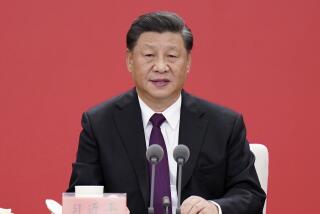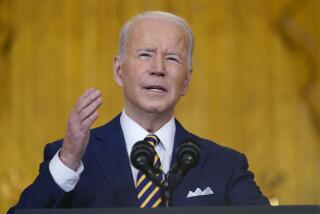Bush Finds Self-Effacement Good Strategy to Save Face
- Share via
WASHINGTON — President Bush was alternating between U.S. and Chinese reporters during an Oval Office appearance with Chinese Vice Premier Qian Qichen last week when Bush asked one of the reporters, “Are you with the Chinese press? Your English is perfect.
“You speak better English than I do,” Bush added with a grin.
Those who would lampoon this president will have to beat him to it. Bush’s speeches increasingly have been spiced with self-deprecating references, preempting critics and delighting his audiences.
Bush may thank “the breast and brightest” for joining the military, as he did at Ft. Stewart, Ga. Or he may declare that it’s “time to change that attitude about how prolific we’re going to be with the people’s money,” when “profligate” would fit better, as he did last week in the East Room. But he can also occasionally join the joke, as he did in October when he performed a “Saturday Night Live” script containing “ambilavent” and “offensible.”
The president’s speeches frequently include a crack about the close election. Appearing with newly elected Israeli Prime Minister Ariel Sharon on Tuesday, Bush said, “He got 66% of the vote. He did a little better at the polls than I did.”
One skeptic about Bush’s self-mocking asides is humorist Michael Colton, editor of “My First Presidentiary: a Scrapbook by George W. Bush.” The book appears to be written mostly in crayon and includes play money labeled “School Voucher” and a Camp David schedule featuring arts and crafts.
“Self-deprecation is a good move, whether you’re trying to get a date or run the country, because it’s endearing and softens you and brings in the pity factor,” Colton said.
“But with Bush, you still have the feeling that he thinks he’s the coolest guy in the frat.”
After two months in office, Bush still talks like an outsider. Even when he is in Washington, he has kept up his campaign practice of referring to the city as “Washington, D.C.,” like some exotic place.
Speaking Thursday to the National Newspaper Assn. on Capitol Hill, Bush betrayed only a nodding acquaintance with jargon that “Saturday Night Live” had mocked Vice President Al Gore for overusing.
“The budget I set up says that payroll taxes are only going to be spent on one thing, and that’s Social Security,” Bush said. “ ‘Lockbox,’ I think, is the terminology they like to use up here.”
And in speaking to a Chamber of Commerce gathering Friday in Maine, he defined his terms as he explained his repeal of rules designed to reduce repetitive-motion strain.
“There was excessive regulation getting ready to be placed on large and small business through what’s called ‘ergonomics,’ ” Bush said.
In the same speech, Bush explained his “tax families” who appear at his speeches to put a human face on the benefits of his tax cut. “I know these numbers sometimes sound just like they’re a bunch of numbers and a lot of talk and balance sheets, and throwing around zeros like it’s common-day practice,” the president said. “And I understand that.”
No action by Bush has so quickly become part of the popular culture as his chilly response when a journalist’s wireless phone went off while covering Sharon’s appearance in the Oval Office. Suddenly, a widespread pet peeve was getting presidential attention.
The New York Daily News called his reaction “phonophobia.” ABC’s “Good Morning America” played the tape and labeled it “cell phone rage.” NBC’s Jay Leno ran a humorously doctored version of the tape. Bill Press, co-host of CNN’s “Crossfire,” confessed to “a G.W. Bush moment” when a cell phone went off during a speech he was giving.
Before reporters were herded into the Qian meeting on Thursday, Bush’s “no cell phone” rule was explained in English and Chinese. Afterward, Bush smiled and said, “I’d like to thank the press for not violating the beeper policy.”
Then he turned to Gordon Johndroe, the press aide he had jokingly scolded for not making sure all the phones were off before the Sharon visit. “We didn’t want to get Gordon in trouble again,” Bush said. “Gordon became an international figure.”
More to Read
Get the L.A. Times Politics newsletter
Deeply reported insights into legislation, politics and policy from Sacramento, Washington and beyond. In your inbox twice per week.
You may occasionally receive promotional content from the Los Angeles Times.








